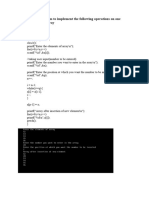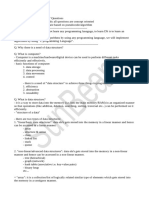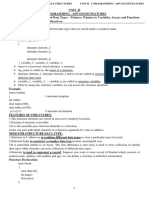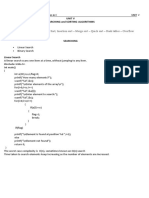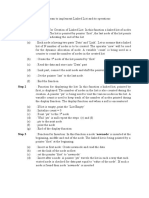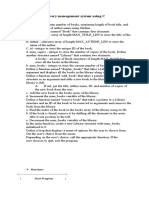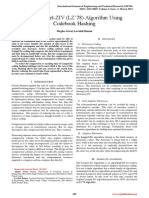0 ratings0% found this document useful (0 votes)
275 viewsData Structures Lab-2
The document contains code for sorting an array using different sorting algorithms like bubble sort, selection sort, and insertion sort. It includes the algorithms, C code to implement each sorting technique on an integer array, and a menu driven program to choose between the different sorting options.
Uploaded by
Vivek KumarCopyright
© © All Rights Reserved
Available Formats
Download as DOCX, PDF, TXT or read online on Scribd
0 ratings0% found this document useful (0 votes)
275 viewsData Structures Lab-2
The document contains code for sorting an array using different sorting algorithms like bubble sort, selection sort, and insertion sort. It includes the algorithms, C code to implement each sorting technique on an integer array, and a menu driven program to choose between the different sorting options.
Uploaded by
Vivek KumarCopyright
© © All Rights Reserved
Available Formats
Download as DOCX, PDF, TXT or read online on Scribd
You are on page 1/ 13
LAB-2
1. WAP to sort an array.
#include <stdio.h>
void main ()
{
int num[20];
int i, j, a, n;
printf("enter number of elements in an array\n");
scanf("%d", &n);
printf("Enter the elements\n");
for (i = 0; i < n; ++i)
scanf("%d", &num[i]);
for (i = 0; i < n; ++i)
{
for (j = i + 1; j < n; ++j)
{
if (num[i] > num[j])
{
a = num[i];
num[i] = num[j];
num[j] = a;
}
}
}
printf("The Sorted Array:\n");
for (i = 0; i < n; ++i)
{
printf("%d\t", num[i]);
}
}
2. WAP to sort the array using Bubble Sorting.
ALGORITHM: -
1. For I = L TO U
2. { FOR J = L TO [ (U – 1) – I ] //need not consider already settled
heavy elements//
//that is why ( u -1 ) – I.
3. { if AR[J] > AR[J + 1] then
{ /* swap the values */
4. temp = AR[J]
5. AR[J] = AR[J + 1]
6. AR[J + 1] = tmp
} /* end of if */
} /* end of inner loop */
} /* end of outer loop */
7. END.
#include<conio.h>
#include<stdio.h>
void Bsort(int a[], int n)
{
int t;
for(int i=0;i<(n-1);i++)
{
for(int j=(i+1);j<n;j++)
{
if(a[i]>a[j])
{
t=a[i];
a[i]=a[j];
a[j]=t;
}
}
}
}
void main()
{
int a[10], i;
printf("Enter the Elements\n");
for(i=0;i<10;i++)
{
scanf("%d", &a[i]);
}
Bsort(a,10);
printf("Array After Bubble Sorting\n");
for(int q=0;q<10;q++)
printf("%d\t",a[q]);
}
3. WAP to sort the array using Selection Sorting.
ALGORITHM: -
1. small = AR[L] /* Initialise small with first array element */
2. For I = L TO U do // In C, 0 To size-1
{
3. small = AR[ I ], pos = I
/*Loop to find smallest element and its position */
4. For J = I TO U do
{
If AR[J] < small then
5. { small = AR[J]
6. pos = J
}
J=J+1
}
/* swap the smallest element with Ith element */
8. temp = AR[ I ]
9. AR[ I ] = small
10. AR[pos] = temp
} /* end of outer loop*/
11. END.
#include<conio.h>
#include<stdio.h>
void Ssort(int a[], int n)
{
int spos, t;
for(int i=0;i<(n-1);i++)
{
spos=i;
for(int j=(i+1);j<n;j++)
{
if(a[spos]>a[j])
{
spos=j;
}
}
t=a[spos];
a[spos]=a[i];
a[i]=t;
}
}
void main()
{
int a[10], i;
printf("Enter the Elements\n");
for(i=0;i<10;i++)
{
scanf("%d", &a[i]);
}
Ssort(a,10);
printf("Array After Selection Sorting\n");
for(int q=0;q<10;q++)
printf("%d\t",a[q]);
}
4. WAP to sort the array using Insertion Sorting.
ALGORITHM: -
//To make A[0] the sentinel element by storing minimum possible
integer value//
1. A[0] = minimum integer-value /* Now start sorting the
array */
2. Repeat steps 3 through 8 for K = 1, 2, 3 . . . N – 1
{
3. temp = A[K]
4. ptr = K – 1
5. Repeat steps 6 to 7 while temp < A[ptr]
{
6. A[ptr + 1] = A[ptr] // Moves element forward
7. ptr = ptr – 1
} // End of inner repeat – step 5’s loop
8. A[ptr + 1] = temp
} // End of outer repeat – step 2’s loop
9. END.
#include<conio.h>
#include<stdio.h>
void Isort(int a[], int n)
{
int i, j, c, pos;
for(i=1;i<n;i++)
{
c=a[i];
pos=0;
while((pos<i)&&(a[pos]<=c))
pos++;
if(pos!=i)
{
for(j=(i-1);j>=pos;j--)
a[j+1]=a[j];
a[pos]=c;
}
}
}
void main()
{
int a[10], i;
printf("Enter the Elements\n");
for(i=0;i<10;i++)
{
scanf("%d", &a[i]);
}
Isort(a,10);
printf("Array After Insertion Sorting\n");
for(int q=0;q<10;q++)
printf("%d\t",a[q]);
}
5. Write a menu driven program with functions for bubble sort, insertion sort
and selection sort
#include<conio.h>
#include<stdio.h>
#include<stdlib.h>
void Bsort(int a[], int n)
{
int t;
for(int i=0;i<(n-1);i++)
{
for(int j=(i+1);j<n;j++)
{
if(a[i]>a[j])
{
t=a[i];
a[i]=a[j];
a[j]=t;
}
}
}
}
void Ssort(int a[], int n)
{
int spos, t;
for(int i=0;i<(n-1);i++)
{
spos=i;
for(int j=(i+1);j<n;j++)
{
if(a[spos]>a[j])
{
spos=j;
}
}
t=a[spos];
a[spos]=a[i];
a[i]=t;
}
}
void Isort(int a[], int n)
{
int i, j, c, pos;
for(i=1;i<n;i++)
{
c=a[i];
pos=0;
while((pos<i)&&(a[pos]<=c))
pos++;
if(pos!=i)
{
for(j=(i-1);j>=pos;j--)
a[j+1]=a[j];
a[pos]=c;
}
}
}
void main()
{
int a[10], i, ch;
printf("Enter the Elements\n");
for(i=0;i<10;i++)
{
scanf("%d", &a[i]);
}
printf("1. Bubble Sorting\n");
printf("2. Selection Sorting\n");
printf("3. Insertion Sorting\n");
printf("4. Exit\n");
printf("Enter Your Choice\n");
scanf("%d", &ch);
switch(ch)
{
case 1:
Bsort(a, 10);
break;
case 2:
Ssort(a, 10);
break;
case 3:
Isort(a, 10);
break;
default:
exit(0);
}
printf("Array After Sorting\n");
for(int q=0;q<10;q++)
printf("%d\t",a[q]);
}
You might also like
- Data Structure & Algorithms: Week - 5 Fall 2018No ratings yetData Structure & Algorithms: Week - 5 Fall 201832 pages
- 1-Write A Program To Implement The Following Operations On One Dimensional Array A) InsertionNo ratings yet1-Write A Program To Implement The Following Operations On One Dimensional Array A) Insertion19 pages
- Experiment No.: 6 Implement Single Linked List Using Stack ADTNo ratings yetExperiment No.: 6 Implement Single Linked List Using Stack ADT21 pages
- Ada Lab Manual: Design and Analysis of Algorithms LaboratoryNo ratings yetAda Lab Manual: Design and Analysis of Algorithms Laboratory48 pages
- Arrays in C': Shashidhar G Koolagudi CSE, NITK, SurathkalNo ratings yetArrays in C': Shashidhar G Koolagudi CSE, NITK, Surathkal26 pages
- menu Driven Program For Selection Sort, Bubble Sort, Insertion SortNo ratings yetmenu Driven Program For Selection Sort, Bubble Sort, Insertion Sort3 pages
- A Code On C Programming For Hotel ManagementNo ratings yetA Code On C Programming For Hotel Management12 pages
- Data Structure and Algorithm Unit 6 Sorting and Hashing100% (1)Data Structure and Algorithm Unit 6 Sorting and Hashing41 pages
- Data Structure and Algorithms Unit-2 StringsNo ratings yetData Structure and Algorithms Unit-2 Strings20 pages
- Aim: C++ Program To Implement Linked List and Its Operations Algorithm: Step 1No ratings yetAim: C++ Program To Implement Linked List and Its Operations Algorithm: Step 13 pages
- Spring End Sem Data Structure Question 2012-13No ratings yetSpring End Sem Data Structure Question 2012-132 pages
- ECE 521: Microprocessor System: CHAPTER 3: Microprocessor Programming in CNo ratings yetECE 521: Microprocessor System: CHAPTER 3: Microprocessor Programming in C42 pages
- 1./ C Program To Find The Given Number Is Perfect Number or NotNo ratings yet1./ C Program To Find The Given Number Is Perfect Number or Not10 pages
- Data Structures Part - A (Shortanswer Questions) : Vemu Institute of TechnologyNo ratings yetData Structures Part - A (Shortanswer Questions) : Vemu Institute of Technology6 pages
- Review Paper On Comparative Analysis of Selection Sort and Insertion Sort100% (1)Review Paper On Comparative Analysis of Selection Sort and Insertion Sort10 pages
- WWW Personal Kent Edu Rmuhamma Algorithms MyAlgorithms Sort100% (1)WWW Personal Kent Edu Rmuhamma Algorithms MyAlgorithms Sort20 pages
- Data Structures Programs Using C++::: 1) Stacks Using Arrays (MSTACK - CPP)No ratings yetData Structures Programs Using C++::: 1) Stacks Using Arrays (MSTACK - CPP)39 pages
- Lists in Java: Part of The Collections Framework0% (1)Lists in Java: Part of The Collections Framework22 pages
- CS 314 - Exam 2 - Fall 2019: Nina Sam Suhas Smruti Terrell TonyNo ratings yetCS 314 - Exam 2 - Fall 2019: Nina Sam Suhas Smruti Terrell Tony15 pages
- (PDF) FORM FACTOR YF ANALYSIS FOR GEAR PAIRS ON MACHINE DESIGN - Anis Sulejmani, Leonard Çomëni e Odhise Koca - Academia - EduNo ratings yet(PDF) FORM FACTOR YF ANALYSIS FOR GEAR PAIRS ON MACHINE DESIGN - Anis Sulejmani, Leonard Çomëni e Odhise Koca - Academia - Edu5 pages
- Algorithms Design and Analysis DP Sheet: Year 3 22 20 - Semester 2No ratings yetAlgorithms Design and Analysis DP Sheet: Year 3 22 20 - Semester 216 pages
- Spreadsheet Modeling & Decision Analysis: A Practical Introduction To Management Science100% (1)Spreadsheet Modeling & Decision Analysis: A Practical Introduction To Management Science56 pages
- Fast Lempel-ZIV (LZ'78) Algorithm Using Codebook Hashing: Megha Atwal, Lovnish BansalNo ratings yetFast Lempel-ZIV (LZ'78) Algorithm Using Codebook Hashing: Megha Atwal, Lovnish Bansal4 pages
- 1-Write A Program To Implement The Following Operations On One Dimensional Array A) Insertion1-Write A Program To Implement The Following Operations On One Dimensional Array A) Insertion
- Experiment No.: 6 Implement Single Linked List Using Stack ADTExperiment No.: 6 Implement Single Linked List Using Stack ADT
- Ada Lab Manual: Design and Analysis of Algorithms LaboratoryAda Lab Manual: Design and Analysis of Algorithms Laboratory
- Arrays in C': Shashidhar G Koolagudi CSE, NITK, SurathkalArrays in C': Shashidhar G Koolagudi CSE, NITK, Surathkal
- menu Driven Program For Selection Sort, Bubble Sort, Insertion Sortmenu Driven Program For Selection Sort, Bubble Sort, Insertion Sort
- Data Structure and Algorithm Unit 6 Sorting and HashingData Structure and Algorithm Unit 6 Sorting and Hashing
- Aim: C++ Program To Implement Linked List and Its Operations Algorithm: Step 1Aim: C++ Program To Implement Linked List and Its Operations Algorithm: Step 1
- ECE 521: Microprocessor System: CHAPTER 3: Microprocessor Programming in CECE 521: Microprocessor System: CHAPTER 3: Microprocessor Programming in C
- 1./ C Program To Find The Given Number Is Perfect Number or Not1./ C Program To Find The Given Number Is Perfect Number or Not
- Data Structures Part - A (Shortanswer Questions) : Vemu Institute of TechnologyData Structures Part - A (Shortanswer Questions) : Vemu Institute of Technology
- Review Paper On Comparative Analysis of Selection Sort and Insertion SortReview Paper On Comparative Analysis of Selection Sort and Insertion Sort
- WWW Personal Kent Edu Rmuhamma Algorithms MyAlgorithms SortWWW Personal Kent Edu Rmuhamma Algorithms MyAlgorithms Sort
- Data Structures Programs Using C++::: 1) Stacks Using Arrays (MSTACK - CPP)Data Structures Programs Using C++::: 1) Stacks Using Arrays (MSTACK - CPP)
- CS 314 - Exam 2 - Fall 2019: Nina Sam Suhas Smruti Terrell TonyCS 314 - Exam 2 - Fall 2019: Nina Sam Suhas Smruti Terrell Tony
- (PDF) FORM FACTOR YF ANALYSIS FOR GEAR PAIRS ON MACHINE DESIGN - Anis Sulejmani, Leonard Çomëni e Odhise Koca - Academia - Edu(PDF) FORM FACTOR YF ANALYSIS FOR GEAR PAIRS ON MACHINE DESIGN - Anis Sulejmani, Leonard Çomëni e Odhise Koca - Academia - Edu
- Algorithms Design and Analysis DP Sheet: Year 3 22 20 - Semester 2Algorithms Design and Analysis DP Sheet: Year 3 22 20 - Semester 2
- Spreadsheet Modeling & Decision Analysis: A Practical Introduction To Management ScienceSpreadsheet Modeling & Decision Analysis: A Practical Introduction To Management Science
- Fast Lempel-ZIV (LZ'78) Algorithm Using Codebook Hashing: Megha Atwal, Lovnish BansalFast Lempel-ZIV (LZ'78) Algorithm Using Codebook Hashing: Megha Atwal, Lovnish Bansal



